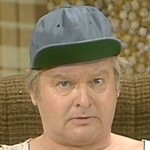
Alfred Hawthorne Hill
(21 January 1924 - 20 April 1992)
Left: Another colorful character, Benny as Helen Horton's husband in "Lean On My Crutch" from "Yield To The Dawn".
Broadcast: April 25, 1979.
Navigation: 1 2 3 4 First Page
Return to Part One

Left: Another colorful character, Benny as Helen Horton's husband in "Lean On My Crutch" from "Yield To The Dawn".
Broadcast: April 25, 1979.
I had written a tribute to Benny here quite some time ago, but it was brief and not very indepth. I decided that it needed to be revised and I could think of no one more capable than our own William Brown to do the job. He has also used some of the material I had written in the original in this new tribute. I have done the photos you see on these four pages as a Tribute to Benny's mastery of so many characters during his twenty years at Thames Television. Hopefully fans will see this as a fitting Tribute to Benny. For a more indepth look at the characters that Benny did over the years, check out the Faces of Benny Hill Pages.
Pop-Up Gallery | Non Pop-Up Gallery
This gallery includes segues from the Crazy World Of Benny Hill. The photos and text for the gallery were put together by William Brown. In order to accomodate those who do not have Pop-Up Support in their browsers, there are two links for each gallery. The Photos in the gallery are 500 pixels wide by 357 pixels high.
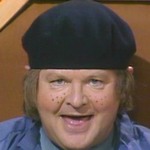
Benny as Gaston Leclerc in
"Friends To Tea with Henry McGee"
Broadcast: March 25, 1981
Following the first British airing of that show, he did two more specials which, while respectable in the ratings, failed to make the Top Ten. While the second of these shows - Dec. 26, 1978, aired exactly ten years to the day after his last BBC special - may have attributed their relatively anemic ratings to the Christmas holiday where for years the "Beeb" had regularly trounced ITV in the ratings, another layer came in the form of a new show which was making a splash on Thames, The Kenny Everett Video Show. Its host, a popular radio DJ, offered a mix of pop hits of the day, comic sketches and characters, and a racy dance troupe named Hot Gossip, which was described as "the antithesis of Pan's People." Apparently, Hill thought it necessary to "reinvent" his show to make it more relevant in this atmosphere, and so, on his March 14, 1979 special, he offered an ostensible "spoof" called "Hot Gossamer" (with Everett being impersonated by Henry McGee). In the context of that pronouncement, it was rather ironic that then-current members of the dance troupe Pan's People (including two future Hill's Angels, Abigail Higgins and a young dancer who would become a breakout star on the show within the next few years, Louise English) participated in this parody. After the relatively stagnant ratings of the last two shows, Hill was once more on top, with 20.85 million viewers seeing his show that week (that special offered some other fan favourites such as "Leprechaun Television" and "Wondergran Meets Dracula"). This show was also the first to be produced and directed by Dennis Kirkland, who would helm every remaining TBHS thenceforward (he eventually served as long on the show as the first six producer/directors in the show's Thames run, combined).
At the same time, another development occurred that would also have an effect on the show. At the time, the show was being sold in a few countries, including Australia, but one market remained elusive: the United States. Reasons given included everything from the show's hour-long running time, to its being "too British" (never mind that Monty Python made it big in the States after being introduced on Public TV in 1974). There were attempts to introduce the show to U.S. audiences, most notably two stations (one in New York, the other in Los Angeles) between 1976 and 1978 as part of an airing of a week's worth of Thames programming under the banner "Thames on 9." But it took a proposal to edit the shows into digestible half-hour chunks for such syndication to be even considered. Credit for this goes to U.S. businessman Don Taffner, who distributed Thames product in the States; and one Ron Gold, an executive at a Philadelphia, PA TV station which was dead last in the ratings at that point. After a few shows were so assembled (by Benny's former BBC producer John Street), TBHS made its U.S. splash in January 1979. After the Philadelphia station's ratings skyrocketed, other TV stations followed suit; at one point, over 100 stations aired the programme in America. It also had a ripple effect on other countries, with foreign sales passing 100 countries before long, and over 140 countries as of just a few short years ago. (In between additions of new episodes, Thames via Taffner tried to fill the gap with an umbrella show, After Benny, Thames Presents, which featured shows hosted by Bernard Cribbins, Tommy Cooper, Frankie Howerd, as well as a sketch comedy show, What's On Next?; none of those made the impact Benny himself did.) The deal that brought the show to America made Hill an international superstar, not to mention a millionaire many times over, increasing his net worth beyond his comprehension, let alone his wildest dreams.

Benny in "Learning All The Time".
Broadcast: February 10, 1982
The high audience response to the March 1979 special apparently convinced Hill and Kirkland that more pulchritude was the way to go and so, in 1980, in the most conspicuous case of Benny being an almost slavish follower of trends rather than a trendsetter (admittedly citing Everett as a major influence in this regard), Hill's Angels were introduced. Their early routines in particular ("Chez Ben Grand Gala," "Madame Louise Summer Collection" and "New York, New York") were fan favourites, and have been the inspiration for tribute websites in the age of the Web, with several early members (Clare Smalley, Leigh Miles and Samantha Spencer-Lane amongst that charter group) remaining fan favourites to this day. A change of direction in the show was also being slowly manifested: the verbal-based routines that were favourites of earlier generations of fans, film and show parodies and his knack for impersonations were gradually being lessened in favor of more fast-motion silent bits (or, as Kirkland loved to call it, "comedy without words") - and that's not counting huge chunks of the show being devoted to the Angels. (During this era, Hill was also telling reporters that he was aiming to do "more writing {and} less performing" - perhaps this addition was a way for him to achieve the latter?) And within a year of their introduction, the seeds of the Hill show's demise began to be sown. Following the airing of his Jan. 7, 1981 special, protests rang out from women's groups throughout Britain protesting what they called the "objectification" and "degradation" of women on the show, in the wake of the airing of the now-classic "Runaway" workout routine. Particular exception was taken to one bit where two Angels (first Elfrida Ashworth, then followed by Abigail Higgins) jumped over a hobby-horse in slow motion (Kirkland later claimed he slowed down this segment to fill time, as he asserted Benny was being "difficult" that particular day of taping). Coincidentally, this was the last show to finish #1 in the ratings for the week, and the last to be seen by 20 million people (Kirkland at the time insisted he only got three complaints out of 20 million). Such protests against the direction of his show, as the decade wore on, would snowball into a campaign of personal hate, vitriol and destruction designed to bring Benny down by any means necessary, with a cabal of feminists and "alternative" comics leading the drive.
Not that it bothered Hill or Kirkland - at first. The show still pulled in mass audiences, but after a few years, it was evident that the ratings advantage he enjoyed this time out was not as sustained as it had been in the 1969-1977 period. After his Jan. 6, 1982 show which was seen by 17.95 million people, the figure dropped to 15.35 million on the next edition (Feb. 10, 1982), then continuing to drop before bottoming out at 9.35 million by the Jan. 16, 1984 show. While ratings of future editions would stabilise, he never again topped 14 million.
(In addition, after 1980 half-hour compilation edits of TBHS, which bore no relation to the U.S. syndicated package, began airing in the fall months on ITV in-between seasons; this also had a downward impact on audience figures for his new shows.)

Benny as Kenny Rogers in "The Monte Carbolic Show".
Broadcast: January 6, 1982
A major turning point was the 1983 series. That year, the double-jointed Corinne Russell, a favourite among many Angels fans, joined the show. The sexual envelope was especially being pushed, with complaints against the show likewise going upwards. One focal point may have been the Jan. 5, 1983 "Superteech" sketch, with echoes of S&M as his ridiculously-costumed superhero character was battling a dominatrix and her henchpeople; another involved two bits in the March 16, 1983 show, a parody of the travel show Holiday (with scenes of toplessness involving Ms. Russell and a partner in toplessness, Nikki Critcher) and the ending runoff involving a naughty schoolboy (Hill) seeing a show with a balloon dancer (Ms. Russell).
As a result of the furor over these sketches, and the greater scrutiny from censor groups which followed, Hill underwent a major retrenchment in that department beginning with the 1984 series. Linda Finch (sister of onetime TBHS regular Roger Finch) was replaced as the Angels' choreographer by former Love Machinist Libby Roberts, who would transform the troupe into a more conventional dance outfit; a year after that, fellow ex-Machinist Lorraine Doyle joined the cast as an Angel, eventually rising to prominence among the other regulars. Another portent of the future occurred in the first show of the 1984 series, with the runoff featuring a little girl named Jade Westbrook (daughter of occasional Hill supporting player Jenny Westbrook); Jade's appearances over the next few years in one show per series, would pave the road for the creation of the "Little Angels" in Benny's final Thames years, just as Love Machine started the road to the introduction of the Angels.

Benny is Professor Arnold McFudpucker in "Superteech".
Broadcast: January 5, 1983
During this period, Louise English had moved from the early Angels dance routines, to elaborate song-and-dance numbers, as part of Hill's grooming her to be a proverbial "all-round entertainer." An important step in that direction was the Jan. 5, 1983 show when she sang "Paradise," "Pour Un Flirt Avec Toi" and "Casanova." On the next show, she displayed her knack for impersonation (until the release of A&E's Set 5 of their Complete & Unadulterated series, unseen for many years after its original airing because one of the people she impersonated, Tommy Cooper, died in 1984). After the 1986 series (and other fan favourite numbers), Louise "left the nest," on her way to becoming a popular stage entertainer in Britain and abroad. But one other actress - uncredited at the time - would go even further than Ms. English in overall prominence: Jane Leeves. Jane appeared in the 1983 series, with leftovers from the taping thereon also appearing in 1984 and 1985 shows. A decade after these appearances, she became a superstar from her role as psychic housekeeper "Daphne Moon" on the long-running U.S. TV sitcom Frasier.
Also during this time, Hill paid his first visit to the States, where he was an instant hit with the glitterati. Burt Reynolds proclaimed himself a Hill fan (and once even wrote Louise English a fan letter); Benny once went to the Playboy Mansion and all he saw was British entertainer Bruce Forsyth; and Clint Eastwood once had a picture of Hill hanging on the walls of his restaurant in California. Eventually, such U.S. personalities as Mickey Rooney and former news anchor Walter Cronkite also identified themselves as Hill fans. Benny himself would frequently visit the U.S. until a few months before his death. And in 1984, he won a special award at the Rose d'Or (Montreux TV Festival) for international sales of his show. Another time, he and Kirkland went to Greece and were mobbed everywhere they went; they later mentioned they were the first to be thrown out of the Acropolis since the Turks. He made his only U.S. stage appearance at Lincoln Center in 1987, in connection with a tribute to Thames Television; the gala was not taped, in accordance with the wishes of the notoriously stage-frightened Hill. This was a few years after his first stage appearance in 24 years in 1984, at a special gathering, Bring Me Sunshine: A Tribute to Eric Morecambe, following the death of the first half of the Morecambe & Wise comedy team that year.

Benny is a kid with a sling shot in "Saucy Boy"
Broadcast: March 16, 1983
Meanwhile, as Hill was being feted and honoured abroad, a sustained drive to mold and sway public opinion against him at home, and essentially "poison the well" in other ways, was well underway. In 1987 - a year when Mr. Hill made no new shows, after he moved out of his Queen's Gate flat and was ostensibly searching for new digs, living during this time in his old family house in his native Southampton, until Dennis Kirkland found him a flat in Teddington which was a five minutes' walk from the studio where he taped his show - one of the "alternative comics," Ben Elton, made a headline-grabbing allegation, both on the TV show Saturday Live and in the pages of Q magazine (in its January 1987 issue), that TBHS was single-handedly responsible for the incidences of rape in England during the period in question, and also suggested the programme incited other acts of violence against women. Such unproven, egregious, demagogic-based assertions were held up as irrefutable fact by various sundry groups who were after Benny anyway, and had a long-lasting damaging effect on his name and reputation in his own country which persists to this day.
In the wake of these charges being leveled against the show, Mr. Hill took another step to change its direction. When he returned with a new series of shows in 1988, he introduced another element: "Hill's Little Angels." Besides the aforementioned Jade Westbrook, the rest of the "Little Angels" consisted of Joanna Kirkland (daughter of producer/director Dennis Kirkland; she was the only one to remain in show business as an actress after TBHS's demise), Adam Johnstone (son of choreographer Libby Roberts), and Richard and Louise Whatling (children of Sue Upton). He insisted that their laughter at certain points was genuine; it also brought to an end his occasional use of stage children which he'd had on from time to time over the years. Behind the scenes, Hill was particularly close to Ms. Upton, her husband Roger Whatling, and their two children; he would often have "days out," giving Benny the opportunity to play "father" to Sue's children.
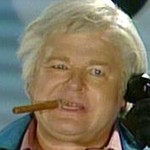
Benny as Hannibal Smith in "The B-Team".
Broadcast: January 2, 1985
After the 1988 series wrapped, Benny lost a key ally in Thames, Philip Jones, who'd retired as Head of Light Entertainment. His successor was John Howard Davies, whose credits included the early episodes of Monty Python, The Goodies and Fawlty Towers, as well as The Good Life (a.k.a. Good Neighbors). He took a look at the shows being made by Thames and noticed that TBHS's cost per episode was of inverse proportion to the ratings, not to mention taking a huge bite out of their income. Over the years, the show's budget went way up, averaging about £450,000 per show towards the end, while audience levels had fallen to roughly half of what they'd been at their peak. Hill's early '80's reliance on T&A had the effect of reducing the average demographic to what would be characterised in the U.S. as "18-to-34 blue collar white male" (previously, it had attracted people of all ages, genders and groups); his toning down of the sexual aspects plus the late '80's addition of the "Little Angels" caused the home audience to erode even further. The "hate Benny" campaign that was pushed by various interest groups and within the media also took a heavy toll; a few months before the end, the Broadcasting Standards Council (BSC) issued a report judging TBHS as "increasingly offensive," which in his case would prove an unshakeable stigma (or proverbial "kiss of death"). There was a leveling off of audiences for the U.S. market as well, though a factor in that could have been a backlash against sexually explicit material in the wake of the Meese Commission report. Even so, Davies and other Thames executives of the time have long denied that the allegations of sexism and "offensiveness" or the "politically correct" climate that became decidedly entrenched in Hill's final years with the company, had any role in the decision they were to make, citing instead the higher costs and lower ratings, plus a concern that the programme was slipping into uninspired mediocrity, with the repetition factor especially being an issue. After airing the 1989 series of shows, Davies called Hill and Dennis Kirkland to his office and advised of his decision to bring TBHS to an end. The various interest groups who were after his scalp, immediately claimed credit for, and openly bragged about instigating, the show's demise (and still do so to this day); they used their perceived victory to not only have repeats of his show blacklisted from British TV (which has mostly held to the present time, apart from a final series of half-hour edits of his shows that ran a few months prior to his death, and heavily-edited airings of his hour-long shows on the now-defunct Granada Plus channel for a few years in the late 1990's and early 2000's), but also, down the road, to work to totally expunge any acknowledgement of Mr. Hill's very existence, all of which was designed to ensure that he would remain a "forgotten man" in his own country. As a sidenote, the demise of TBHS freed up monies for Thames to develop and produce a new "silent" comedy series, Mr. Bean, which starred Rowan Atkinson as the title character, ran from 1990 to 1995 and spawned a movie and animated series.
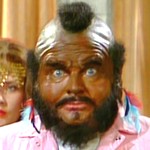
Benny as Mr. T in "The B-Team".
Broadcast: January 2, 1985
The cancellation totally devastated Benny (or, as one former supporting player put it, "He started to die from there"). While he had steadily put on the pounds in recent years, after his show was brought to an end his weight totally ballooned, with the inevitable decline in his health following, as he was not taking care of himself. He did try to keep active afterwards, taping a new special, Benny Hill's World Tour: New York in 1990 (outdoor scenes were shot in New York with a U.S. cast including comic Joey Faye and actress Lee Meredith who was "Ulla" in the original 1968 movie version of Mel Brooks' The Producers; the studio scenes were shot in Teddington on a "contractor's" basis, with Hill working with his key "regular" cast for what turned out to be the last time; the show was produced by an independent company, with Philip Jones and Don Taffner as the executive producers, which explains why the contents of this show haven't been included in syndication) and first aired on the USA Network in 1991; it didn't air in Britain until two years after his death, and even then in two parts. There was more an emphasis on comedy, relatively speaking, than his more recent efforts, and on paper more in league with his mid-1970's works (highlights include Benny playing both Dr. Ruth Westheimer and Roseanne Barr in a TV show parody), but the energy level wasn't much there. He did some taping of short sketches on the West Coast, footage of which later turned up on a DVD, The Benny Hill Collection; and recorded his more recent compositions of the last two decades (at Abbey Road Studios, no less) on a CD, released originally as Benny Hill - The Best Of and then included in that aforementioned DVD. And he took part in a documentary on his life and career, originally aired as part of the BBC's Omnibus series, that would be marketed throughout the world as Benny Hill: The World's Favourite Clown. He'd learned that the great Charlie Chaplin (whom he'd idolised) was a big fan of his, and was invited to Chaplin's private study in Switzerland by his son Eugene.
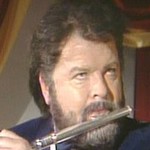
Benny is flautist James Gaulstone in "For Ever Love"
Broadcast: April 8, 1985
But in early 1992 he developed chest pains, and went to a hospital where he was diagnosed with a heart attack (and decided against possibly life-saving but, at his age and in his condition, potentially risky heart-bypass surgery); he also experienced a failure of his lone remaining kidney. During one of his hospital stays, he was visited by singer Michael Jackson who posed with "The Lad Himself" for one memorable photo. Former and then-current colleagues later recalled him being heavily nostalgic at that point. In his last days, he saw his most famous protegée (and one of his favourite Angels), Louise English, in her first major West End (London) stage role in the musical Me and My Girl which was a turning point in her career; she remains a popular theatre performer in the U.K. to this day, getting to where she is now with Benny's help. Mr. Hill was accompanied to the theatre by Sue Upton and another former Hill's Angel, Samantha Spencer-Lane. He also posed for a final set of photographs with Louise which were published in the papers at the time. Ms. English would later relate that during their chat in-between performances of the show, as they reminisced about old times and he complimented her on her performance, she noticed there was something wrong with Benny, physically - and indeed there was. Just a few days later, on Easter weekend 1992, Benny Hill died of a massive heart attack at his Teddington flat, alone, at age 68 as he was watching television. (That same weekend, another British comic legend, Frankie Howerd, died at age 75.) A few days later, on April 20th, his longtime friend and producer/director, Dennis Kirkland, discovered his lifeless body still seated next to the TV which was still on. He was to have signed a contract with another ITV franchise, Central Independent Television, to do a series of specials for them. As fans, we have wonderful memories of watching Benny Hill, his wonderful cast, and of course his lovely Hill's Angels. This website is affectionately dedicated to this remarkable comedian and entertainer.
Return to Part One
Navigation: 1 2 3 4 First Page